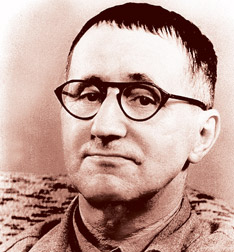Understanding Bertolt Brecht
K S SIVAKUMARAN
I am not a keen observant of the Brechtian theatre and yet I had to
study him for examination purposes. He was immensely popular in Sri
Lanka in the 1960s and 1970s. Some of his plays had been translated into
Sinhala and produced by eminent theatremen of yester year. Someone also
translated one of his plays into Thamil.
|

Bertolt Brecht |
Brecht was a German. He wrote his plays in German and was greatly
influenced by Marxism. His plays had a social purpose. He was a
theoretician on western theatre and wrote plays, engaged in stage
directing and trained actors.
We learn that he wished “to reinvest drama with the capacity to make
men see clearly the way in which they live, to judge themselves and if
necessary to take vital decision to change their middle-class mode of
life”.
Not understanding him properly at the earlier stages of my
familiarity with his form of theatre, I felt his plays were an amalgam
of slogan and propaganda. But critics assured that he was original and
he invented a theatre of statement in which he exposed each and every
man’s need to define himself in a positive and challenging relationship
with society.
For instance they explained that: “In order to implement his concept
of theatre Brecht evolved on the one hand a combination of technical
devices and on the other a mode of acting appropriate to his didactic
requirement.”
“Primarily he wished to confront his spectators with a deliberately
theatrical phenomenon which contained no pretence, no attempt at
illusion. Stage-lighting was to be prominent and harsh, the machinery of
effects left visible, and change of time and place indicated by a
placard or other obvious convention.”
Truly, Brecht was an experimental theatre personality then. In
watching a play we temporarily ‘suspend belief in the scenes’, but
Brecht’s idea was that we should continually and intensely be aware that
what we are watching is a theatrical event.
He insisted that his actors should abandon the idea of ‘living apart’
of entering into a character to such an extent that they assumed ‘his
personality and purpose and entirely lost their own. He taught the actor
to maintain a certain distance from his role.”
A leading Lankan journalist and critic, Philip Coorey, a few decades
ago, analysed the stagecraft of Brecht in an article which I found
stimulating. I wish to share some of his views with you. Excerpts:
“Brecht’s plays are first and foremost what he called;
non-Aristotelian’, and are total rejection of what we may call the magic
world of the theatre. He was not concerned wit illusion or Naturalism on
stage - and the main general theme throughout is the moral paradox, the
violent clash between ends and means in practically every aspect of
human life. He was a Marxist- but his plays cannot be reduced to
propaganda for the Marxist ideology”
Students will know that his famous plays include Mother Courage, Good
Woman of Setzuan, Galileo and the Caucasian Chalk Circle.
Coorey compared Brecht with Stanislavsky whom I like best. Says he:
The Bechtian technique was the very opposite of the Stanislavsky method
where the actors had to create their roles from the side out. Here,
there was objectivity and the devices he used began gradually even in
the western theatre to attract more attention that they deserved”
At this point I must add that I like the playing of Marlon Brando and
Robert de Niro in the films. One could say that they were ‘method school
actors’.
It was the 80th birth anniversary of Bertrolt Brecht on February 10,
1978. One of our living scholars, academic and critic Prof Ashley Halpe
wrote an article then Ceylon Daily News on Brecht as a poet.
He informed that Brecht was introduced to Lankan audiences by Lyn
Ludowyck who produced the Good Woman of Setzuan with the University
Dramatic Society in English in 1949. He also added that the producer’s
epic style had an immediate and abiding influence on Sinhala theatre
from then onwards.
Parents of young people would remember that the late Henry Jayasena
and the late Sugathapala de Silva , veteran theatre people in Sinhala
theatre world, translated and produced two of Brecht’s plays into
Sinhala successfully. Ernest Mc Intyre, another Lankan now living in
Australia produced the Caucasian Chalk Circle in English, which was also
acclaimed.
A scholar (I am afraid I failed to note his name in my scrap book
when I took the following excerpt from an article titled: Drama and
Detachment: A View of Brecht’s Style of Theatre”) has rightly said that
‘Brecht has certainly tried to make political reality the centre of his
art and the springboard of his inquiry into private and public conduct.
Even when his main characters themselves have only a lazy awareness
of politics, they exemplify the political nature of human nature and the
‘human condition’ with which Brecht has concerned himself has always
been intrinsically a political condition.
How Brecht’s outlook has determined his form is, however, the
paramount question; for his uniqueness as an artist lies not in his
content or politics, but in the manner in which he has translated a bias
into drama, production style, and dramatic theory”
Students of world literature via English may have to study the
contribution of Bertrolt Brecht too and hope this note will enthuse them
to read more on the subject.
|



